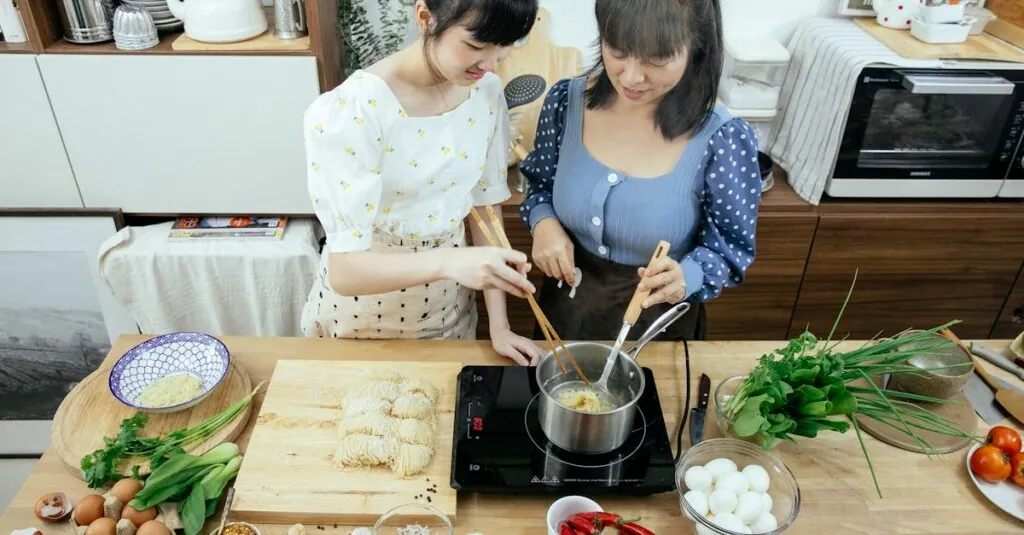Boiling eggs might seem simple, but one wrong minute can turn your breakfast dreams into rubbery nightmares. Whether you’re aiming for a perfectly soft-boiled egg that oozes golden yolk or a hard-boiled masterpiece that’s ready for deviled egg glory, timing is everything.
Table of Contents
ToggleUnderstanding Egg Boiling
Boiling eggs requires precision in timing. Each cooking duration alters the texture, resulting in either soft or hard yolks. Soft-boiled eggs take about 4 to 6 minutes, providing a creamy yolk that complements various dishes. Hard-boiled eggs, on the other hand, require 9 to 12 minutes for a fully cooked yolk, ideal for recipes like deviled eggs or egg salad.
Temperature plays a vital role in this process. Starting with cold eggs or warm ones affects the cooking time. Cold eggs generally take longer, while room-temperature eggs cook more evenly. For consistency, placing eggs in a single layer in the pot ensures uniform cooking and prevents cracking.
Water volume matters too. Sufficient water covers the eggs entirely for even heat distribution. An additional factor includes adjusting cooking times based on egg size; larger eggs need an extra minute or two, while smaller eggs may cook faster. Utilizing a timer can help achieve the desired doneness without guesswork.
Removing eggs promptly from boiling water maximizes results. Transferring them into an ice bath immediately stops the cooking process, preserving the desired texture. For perfectly cooked eggs, individuals must practice and adapt their timing based on their cooking environments.
Experimenting with times and techniques leads to optimal choices based on personal preferences. Soft yolks may not suit everyone’s taste, so finding the right cooking time is essential for achieving the perfect egg.
Factors Influencing Boiling Time
Boiling time for eggs varies based on several key factors that affect the final outcome. Understanding these factors helps achieve the perfect egg every time.
Egg Size
Egg size impacts boiling time significantly. Larger eggs require additional cooking time compared to medium or small eggs. A general rule states that medium eggs may take around 9 to 10 minutes, while large eggs might need 10 to 12 minutes. Experimenting with different sizes helps determine the ideal timing for each type.
Altitude
Altitude also plays a critical role in boiling eggs. At higher elevations, water boils at a lower temperature, which results in longer cooking times. For example, at elevations above 3,000 feet, adding an extra minute or two may be necessary for hard-boiled eggs. Adjusting boiling times based on altitude ensures eggs cook thoroughly and achieve the desired doneness.
Desired Doneness
Desired doneness dictates how long eggs should boil. For soft-boiled eggs with a runny yolk, 4 to 6 minutes offers the best results. In contrast, hard-boiled eggs require 9 to 12 minutes for a fully cooked yolk. Timers help maintain precision, as even short variances can alter yolk texture. Adjusting cooking times according to personal preference leads to perfectly boiled eggs every time.
Recommended Boiling Times
Cooking eggs requires attention to timing and precision for optimal results. The following guidelines outline the recommended boiling times for various egg consistencies.
Soft Boiled Eggs
For a soft-boiled egg with a creamy yolk, boil the egg for 4 to 6 minutes. Start timing once the water reaches a rolling boil. At 4 minutes, the yolk remains runny, while at 6 minutes, it becomes slightly firmer. Adjusting the time can accommodate individual preferences. Cooling the eggs in an ice bath immediately after boiling halts the cooking process and keeps the texture intact.
Medium Boiled Eggs
Medium-boiled eggs require approximately 7 to 8 minutes of boiling time. Eggs cooked to this duration showcase a partially set yolk, which is still a bit creamy yet more substantial than a soft-boiled egg. Begin timing as soon as the water begins to bubble. The ice bath is essential after cooking, as it prevents overcooking and enhances the overall eating experience.
Hard Boiled Eggs
To achieve a hard-boiled egg, 9 to 12 minutes of boiling time is necessary. Begin the countdown when the water displays a vigorous boil. At 9 minutes, the yolk remains slightly soft in the center; extending to 12 minutes creates a fully set yolk, ideal for dishes like potato salad or deviled eggs. An ice bath after cooking allows for easier peeling and preserves the egg’s texture.
Tips for Perfectly Boiled Eggs
Start with cold or room-temperature eggs for consistent results. Using eggs straight from the refrigerator can lead to cracking during boiling. Place eggs in a single layer in the pot to ensure even cooking. Cover the eggs completely with water, allowing uniform heat distribution.
Monitor cooking times closely. Soft-boiled eggs require 4 to 6 minutes, while medium-boiled eggs need 7 to 8 minutes. Hard-boiled eggs take 9 to 12 minutes to achieve a firm yolk. Begin timing only when the water reaches a vigorous boil for accuracy.
Adjust cooking times based on egg size. Larger eggs need a bit longer than medium or small ones. Keep in mind that altitude can influence boiling time; higher elevations require an extra minute or two for hard-boiled eggs.
Using a timer is crucial for precision. Once the cooking time is complete, transfer the eggs to an ice bath immediately. This stops the cooking process, preserving the desired texture and preventing overcooking.
Experiment to find personal preferences. Not everyone enjoys the same yolk consistency, so adjusting times can lead to perfect results tailored to taste. Keep these tips in mind for consistently great outcomes with every batch of boiled eggs.
Mastering the art of boiling eggs requires attention to detail and a willingness to experiment. By understanding the nuances of timing temperature and egg size anyone can achieve their desired level of doneness. Whether it’s a creamy soft-boiled egg or a firm hard-boiled one the right technique makes all the difference.
With practice and a reliable timer even novice cooks can create perfectly boiled eggs that suit their taste. The journey to egg perfection is about finding what works best for individual preferences and enjoying the process along the way. Happy boiling!





